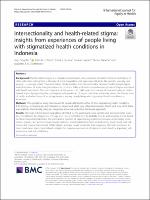The political origins of health inequity: prospects for change
| Ottersen, Ole Petter
Dasgupta, Jashodhara Blouin, Chantal Buss, Paulo Chongsuvivatwong, Virasakdi Frenk, Julio Fukuda-Parr, Sakiko Gawanas, Bience P. Giacaman, Rita Gyapong, John Leaning, Jennifer Marmot, Michael McNeill, Desmond Mongella, Gertrude I. Moyo, Nkosana Møgedal, Sigrun Ntsaluba, Ayanda Ooms, Gorik Bjertness, Espen Lie, Ann Louise Moon, Suerie Roalkvam, Sidsel Sandberg, Kristin I. Scheel, Inger B. |
|
| The Lancet-University of Oslo Commission on Global Governance for Health | |
| 2014-02-11 | |
| The Lancet | |
| The Lancet 2014. 383 (2), p 630-667. | |
|
Despite large gains in health over the past few decades, the distribution of health risks worldwide remains extremely and unacceptably uneven. Although the health sector has a crucial role in addressing health inequalities, its eff orts often come into confl ict with powerful global actors in pursuit of other interests such as protection of national security, safeguarding of sovereignty, or economic goals. This is the starting point of The Lancet–University of Oslo Commission on Global Governance for Health. With globalisation, health inequity increasingly results from transnational activities that involve actors with diff erent interests and degrees of power: states, transnational corporations, civil society, and others. The decisions, policies, and actions of such actors are, in turn, founded on global social norms. Their actions are not designed to harm health, but can have negative side effects that create health inequities. The norms, policies, and practices that arise from global political interaction across all sectors that aff ect health are what we call global political determinants of health. The Commission argues that global political determinants that unfavourably aff ect the health of some groups of people relative to others are unfair, and that at least some harms could be avoided by improving how global governance works. There is an urgent need to understand how public health can be better protected and promoted in the realm of global governance, but this issue is a complex and politically sensitive one. Global governance processes involve the distribution of economic, intellectual, normative, and political resources, and to assess their eff ect on health requires an analysis of power. This report examines power disparities and dynamics across a range of policy areas that aff ect health and that require improved global governance: economic crises and austerity measures, knowledge and intellectual property, foreign investment treaties, food security, transnational corporate activity, irregular migration, and violent confl ict. |
|
| World health
Health planning |
|
| Health inequity
Health risks Health sector Global governance for health |
|
| Article | |
| 38 p. | |
| Text | |
| application/pdf | |
| This Item is protected by copyright and/or related rights. | |
| Restricted access | |
| The Lancet Commissions | |
| https://resources.equityinitiative.org/handle/ei/79 |
This item appears in the following Collection(s) |
|
|
Collections
|
Related items
Showing items related by title, author, creator and subject.
-
Human resources for health: task shifting to promote basic health service delivery among internally displaced people in ethnic health program service areas in eastern Burma/Myanmar
Low, Sharon; Tun, Kyaw Thura; Mhote, Naw Pue Pue; Htoo, Saw Nay; Maung, Cynthia; Kyaw, Saw Win; Oo, Saw Eh Kalu Shwe; Pocock, Nicola Suyin (2014-09-29)
Background: Burma/Myanmar was controlled by a military regime for over 50 years. Many basic social and protection services have been neglected, specifically in the ethnic areas. Development in these areas was led by the ethnic non-state actors to ensure care and the availability of health services for the communities living in the border ethnic-controlled areas. Political changes in Burma/Myanmar have been ongoing since the end of 2010. Given the ethnic diversity of Burma/Myanmar, many challenges in ensuring health service coverage among all ... -
Can mHealth and eHealth improve management of diabetes and hypertension in a hard-to-reach population? —lessons learned from a process evaluation of digital health to support a peer educator model in Cambodia using the RE-AIM framework
Steinman, Lesley; Pelt, Maurits van; Hen, Heang; Chhea, Chhorvann; Lan, Channe Suy; Te, Vannarath; LoGerfo, James; Fitzpatrick, Annette L. (2020-10-05)
Background: The burden of non-communicable diseases (NCDs) is increasing in low- and middle-income countries (LMICs) where NCDs cause 4:5 deaths, disproportionately affect poorer populations, and carry a large economic burden. Digital interventions can improve NCD management for these hard-to-reach populations with inadequate health systems and high cell-phone coverage; however, there is limited research on whether digital health is reaching this potential. We conducted a process evaluation to understand challenges and successes from a digital ... -
Intersectionality and health-related stigma: insights from experiences of people living with stigmatized health conditions in Indonesia
Rai, Sarju Sing; Peters, Ruth M. H.; Syurina, Elena V.; Irwanto, Irwanto; Naniche, Denise; Zweekhorst, Marjolein B. M. (International Journal for Equity in Health, 2020-12)
Abstract Background Health-related stigma is a complex phenomenon, the experience of which intersects with those of other adversities arising from a diversity of social inequalities and oppressive identities like gender, sexuality, and poverty – a concept called “intersectionality”. Understanding this intersectionality between health-related stigma and other forms of social marginalization can provide a fuller and more comprehensive picture of stigma associated with health conditions. The main objective ...



